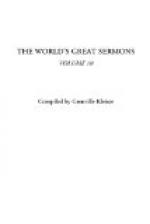It has satisfied the hunger of men whose liberalism came from their being made liberally. Large and capacious souls of mighty yearnings are they. They stand in contrast with the puny critics who assert that the Bible fails to feed them, because they have never tasted its nourishment.
Liberal Christianity, separating itself from the dogmatism which would make Christianity a book religion, worshiping a literary idol rather than loving a human revelation of the divine, knows it is not an ignorant lot of men and women who have received most from the Bible and spoken most gratefully of its message. When we think of sending the Bible to barbarism, with the hope of creating in its stead civilization, we can look into the face of John Selden, one of the most illustrious of English lawyers, when he says: “I have surveyed most of the learning that is among the sons of men, yet at this moment I can recall nothing in them on which to rest my soul, save one from the sacred Scriptures, which rises much on my mind. It is this: ’The grace of God, which bringeth salvation, hath appeared unto all men, teaching us that denying ungodliness and worldly lusts, we should live soberly, righteously, and godly in this present world, looking for that blest hope and the glorious appearing of the great God and our Savior Jesus Christ, who gave himself for us that he might redeem us unto himself, a peculiar people zealous of good works.’” Liberal religion must include Selden. We will not be deterred from giving the Bible to heathenism of any kind when we remember that Sir William Jones has left these words: “The Scriptures contain more true sublimity, more exquisite beauty, and finer strains of poetry and eloquence than could be collected from all other books that were ever composed in any age or in any idiom.” Liberal religion must be as broad as Sir William Jones.
This is a very needy world, and many are the institutions of evil that need to be changed for institutions of goodness. If we are to believe the eloquence of hopeless unbelief, we ourselves will only be the slaves of a fatalism which says that man is but a result of forces; that what we call crime is but a part of the necessary course of things, and that there is no such thing as moral responsibility. This makes all reform or efforts at staying the tide of evil useless. Oftentimes the heart of the man who has ceased to read his Bible gets the victory over this dreadful philosophy, and it is not remarkable that the skeptic becomes the exponent of freedom, charging like a host of war upon all institutions of slavery. Liberal theology puts its one hand on the dogmatist who tells him to accept literal infallibility, and its other on the sincere lover of men who has lost his Bible entirely. And liberalism says: It is in just such moments that we trust our Bible the most, and we remember that William Wilberforce, who lifted the chains from the bondmen, has said: “I never knew happiness




